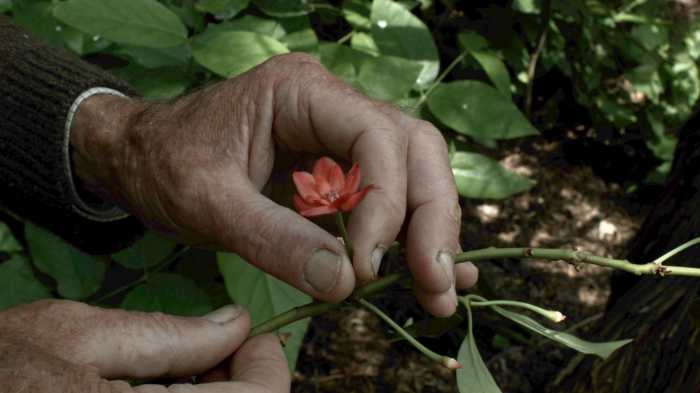Canadian director D. W. Waterson’s “Backspot” doesn’t do much to distinguish itself from other films about student athletes or artists struggling to become the most accomplished versions of themselves. In the queer, non-binary filmmaker’s feature debut (expanding on their 2017 short of the same name), Riley (Devery Jacobs) gives her all to her school’s cheerleading squad. The opening scene is told from her point of view, twirling around ecstatically. Similar images are repeated through the film, but they turn grimmer, reflecting a growing problem with panic attacks. High on edibles, her joy suddenly transforms into anxiety.
Riley is dating her fellow cheerleader Amanda (Kudakwashe Rutendo). Although set in a high school, “Backspot” never shows a moment of class time or homework. Riley’s entire social circle consists of other cheerleaders. Her life seems consumed by her work as an athlete — and it’s depicted as grueling, painful labor, not adolescent fun. When she and Amanda make the team, this introduces a note of rivalry to their relationship. The skill level required to succeed in cheerleading takes an increasing toll on her body. She plucks her eyebrows compulsively. She also greets the arrival of a lesbian coach, Eileen (bi actor Evan Rachel Wood), with excitement.
The most interesting aspects of “Backspot” lie at its edges. The film’s only male character is the school’s second coach, Devon (Thomas Antony Olajide.) The girls watch a video of him dancing shirtless and wearing makeup at a gay club. Riley winds up going there, getting caught drunk. He drives her back to his apartment, where the two have a brief, tender conversation, during which he casually references his sobriety. This feels like the only remaining moment from a much larger subplot, as he never plays much of a role in the rest of the film.
“Backspot” treats representation casually but thoroughly. Although Riley is played by an indigenous actor, the film never mentions her ethnicity. Nor does the fact she’s dating a Black girl come up. Her mom doesn’t want her to have sex with her girlfriend, but no one has a problem with lesbian teenagers. Men are a structuring absence. During a party, Riley argues with a girl who claims that cheerleaders are just objectifying themselves for the male gaze, complaining about a photo of a teenager in a crop top. Riley insists that cheerleading is about skill, not pleasing men, but while that’s true for her, a heavier girl suggests her looks are the reason she didn’t make the team. (The film is careful not to sexualize its characters.) But this discussion is confined to one scene. The film brings up the experiences of people with different body types and then casts them aside.
The fact that Eileen’s a lesbian doesn’t prevent her character from becoming a stock type. Much of her dialogue could’ve been given to a drill instructor in a film about a new recruit in the army. She urges the cheerleaders to keep up a tough façade, saying, “If you want to survive in the world, you can’t show weakness.” Isolated and lonely, she eats lunch by herself in her car. Riley starts off admiring her as a mentor, but “Backspot” hints that she develops a crush on Eileen. For her part, the older woman may be acting stereotypically tough due to negative experiences as a lesbian, but they seem far removed from the film’s accepting environment.
“Backspot” has a distinctive style, with quick cuts and a swaying handheld camera representing the excitement of cheerleading. Riley’s panic attacks are shown via extreme close-ups from her point of view, with distorted music. Purple light, obligatory in recent films about LGBTQ youth, casts a glow over parties and clubs. But the film doesn’t establish itself beyond the basics of its setting and characters. The idea that driving oneself too hard as an athlete or artist can become a version of self-harm is familiar from films like “Whiplash” and “Black Swan.” “Backspot” zeroes in on the ugly bruises on its characters’ bodies, as well as the possibility of serious injury. But by the end, it seems caught between competing moods and impulses, ending on an overly cheerful note that chases away the film’s more disturbing implications.
“Backspot” | Directed by D. W. Waterson | XYZ Films| Opens May 31st



































